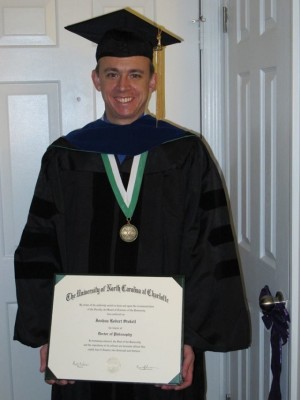Researcher Succumbs To Cystic Fibrosis, Leaves Unique Investigative Legacy
Written by |

Cystic Fibrosis researcher Dr. Joshua R. Stokell, PhD, 36, of Charlotte, NC, passed away on June 8, 2015, due to complications associated with his own lifelong battle with Cystic Fibrosis (CF). A graduate of the University of North Carolina at Charlotte, Dr. Stokell had studied Cystic Fibrosis after earning his bachelor’s degree in 2008 and a PhD in Microbiology in 2013 in hope of being able to make a difference in the lives of other CF patients. At the time of his death, he was a Post- Doctoral Fellow at UNC-Charlotte continuing his Cystic Fibrosis research with Todd Steck, a biological sciences professor who has been his mentor, and had been lead author on a recent article published in the Journal of Clinical Microbiology, originally reported on here by Cystic Fibrosis News Today’s Kara Elam last April, describing an unusual, single-patient study and an important finding that may point to an immediate cause of CF exacerbations.
The paper, entitled “Analysis of Changes in Divrsity and Abundance of the Microbial Community in a Cystic Fibrosis Patient over a Multiyear Period“ (J. Clin. Microbiol. January 2015 vol. 53 no. 1 237-24 doi: 10.1128/JCM.02555-14), is coauthored by Dr. Stokell with Raad Z. Gharaibeh, Timothy J. Hamp, Malcolm J. Zapata, Anthony A. Fodor, and Todd R. Steck — all of the University of North Carolina at Charlotte.
The co-authors on the study that Stokell was a part of note that the evolution of pulmonary disease in cystic fibrosis (CF) usually begins when bacteria become trapped in lung mucus and established as a chronic infection, and that while most CF patients experience periods of stability, pulmonary exacerbations (PEs) can occur multiple times per year and result in permanent damage to the lungs. They observe that little is known of the mechanisms behind the shift from a period of stability to a PE, but speculate that it is likely to be associated with changes in the bacterial community. In this study, they identified changes in the lung microbiota to determine if they reflect patient health, indicate the onset of exacerbations, or are related to antibiotic treatment.
The study investigators found that sudden growth of a specific bacterium, Burkholderia multivorans, in particular, preceded periods of acute illness, noting that while B. multivorans is known as a common pathogen in CF patients’ lungs, it is far less abundant than another pathogen, Pseudomonas aeruginosa, whose populations did not show significant changes prior to the life-threatening episodes.
Dr. Stokell and his colleagues had succeeded in implicating B. multivorans by means of a detailed genomic and metagenomic analysis of a unique, extensive collection of lung sputum samples taken from an adult CF patient (Dr. Stokell) twice-weekly over a three-year period, on which they performed quantitative PCR (qPCR) and Illumina sequencing, Noting that while many DNA-based studies have shown CF microbiota to be relatively stable, they observed an increase in the total bacterial abundance over time and particularly an increase in the abundance of Burkholderia multivorans, a CF-associated pathogen, prior to the occurrence of a PE. Combining these DNA-based techniques with frequent sampling, the investigators identified a potential initiator for exacerbations and described a response of the CF microbiota to time and antibiotic treatment not observed in previous CF microbiota studies.
Since Joshua Stokell was both a researcher and the study subject in this unusual instance, the team was able to gain unparalleled access to the subject’s life history and medical records, providing critical context for the findings, with the study representing the most intensive sampling of a single CF patient to date. “I have the capability to help others through my work,” Dr. Stokell commented to the Charlotte Observer shortly before his death. “That’s what really drives me the most.” The surviving researchers plan to conduct further confirmatory studies in a larger sample population in the future.
Cystic Fibrosis (CF) is a rare, progressive, life-threatening autosomal recessive, life-shortening chronic disorder that affects the lungs and digestive systems, disrupting the body’s ability to hydrate and effectively clear mucus in the lungs and/or digestive tract. According to the Centers for Disease Control (CDC), approximately 1,000 new cases are diagnosed in the US each year with more than 75 percent of those patients under the age of two at the time of diagnosis. An estimated 30,000 children and adults in the US and 70,000 worldwide have the disease.
RELATED: Jennifer’s Story: A Life of Beauty and Loss in Facing Cystic Fibrosis
In persons with CF, a defective gene and its protein product cause the body to produce unusually thick, sticky mucus that causes recurrent life-threatening lung infections and loss of lung function, restricts breathing, obstructs the pancreas which stops natural enzymes from helping the body break down and absorb food and results in digestive problems. Patients diagnosed with CF typically have a lifespan of approximately 30 years, but that metric has been improving with greater understanding of the disease and development of better treatments resulting in many CF patients now living into their forties, and a few into their fifties.
The genetic mutation that causes CF affects the normal functioning of the lungs and digestive system by creating abnormal amounts of very sticky mucus that covers the lungs, pancreas, and other important organs of the respiratory and digestive systems. This sticky mucus attracts foreign pathogens, such as viruses and bacteria, making patients more susceptible to infectious diseases (i.e. pneumonia). The high microbial burden causes inflammation of the lung tissue and a high likelihood of tissue destruction due to the frequency of infections that most often lead to pulmonary exacerbation in these patients.
A UNC Charlotte Exchange Online in memoriam article notes that chronic diseases like CF are often daunting puzzles that require an extraordinary amount of research effort to understand, and the long-term interaction between the human body’s dynamic systems and the disease can be extremely complex, even when there’s a relatively simple initiating cause, such as a genetic defect. Consequently, researchers studying such diseases need an extra measure of commitment and passion to gird them in the struggle with the intricate complexities involved.
 Sources
Sources
University of North Carolina at Charlotte
The Journal of Clinical Microbiology
The Charlotte Observer
Centers for Disease Control
Image Credit:
University of North Carolina at Charlotte






